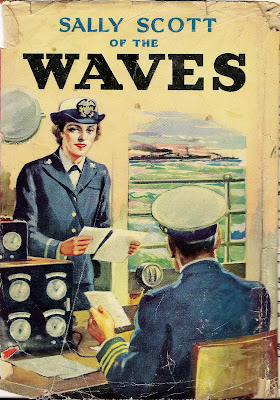Monday, 27 December 2010
Off Topic - Children's Books during World War II
This is to pick up the thread of a conversation we began in the comments section of this post a month ago that introduced the series on home front “war stories”. I’ve had another project on the back burner for some time with which some of you might be able to help.
This involves a possible book about children’s books written during World War II, about that war. We’re not talking about any classics of children’s literature here, no Caldecott or Newbery Award winners; what I mean are those series books, the pulp novels that engaged teens and pre-teens with a weird combination of childlike adventure and all-too adult angst about the consequences of not doing one’s patriotic duty during the war.
Some of these were a series featuring the same character, like the “Dave Dawson” books, where he and his pal, Freddie Farmer, fought the enemy pretty much all over the globe. Likewise “Red Randall” who began his teenage trial by fire at Pearl Harbor. Both series were written by R. Sidney Bowen.
“Cherry Ames” went from nursing school into the Army, served in Panama, some non-disclosed islands in the South Pacific, flew through a hailstorm of gunfire over Germany, and finished up her tour of duty as a nurse in a veteran’s hospital. I won’t guess how many girls pursued nursing careers because of this series, but I know there are some out there who admit to it.
Other series followed a theme of wartime service but featured different characters. Whitman Publishing, who practically cornered the market in children’s series books at the time, produced several pulp novels under their “Fighters for Freedom Series”. This gave us “Nancy Dale - Army Nurse”, “Dick Donnelly of the Paratroops”, “Norma Kent of the WACS,” “Sally Scott of the WAVES”. “Kitty Carter of the Canteen Corps” showed us we didn’t necessarily have to be in the military to help the war effort.
The publisher touted these as “Thrilling novels of war and adventure for modern boys and girls.”
It was a tough being a modern boy or girl when war might be all you remembered, and would determine a future you could not imagine, a future which seemed to hang precariously on whether or not you displayed your full measure of devotion and courage. Just eating your vegetables wasn't good enough anymore.
There are several elements to these stories which are quite striking. One is the, in some cases, unsparing description of death and cruelty, and the fatalistic manner in which the tone of these stories seems to indicate the young reader should accept these conditions. Nancy Dale’s troop ship is torpedoed, and she spends several days in a lifeboat with a handful of other nurses and crew members. One dies and they dump the body overboard.
At one point in the story she receives word her brother is missing in action and presumed dead. A family friend, comforting her, tells her not to hold out much hope of his survival. “Don’t let wishful thinking keep you from facing reality, my dear. There’re many things worse than death in this war.” How would a kid, who had relatives in the war, take this message?
On the frontispiece of “Red Randall at Pearl Harbor”, published by Grosset & Dunlap, we are reminded that “This book, while produced under wartime conditions, in full compliance with government regulations for the conservation of paper and other essential materials is completed and unabridged.” Even the book itself has the imprimatur of self sacrifice.
If you find these books today, the pages are yellowed, few of them have book jackets left intact, but many of them have the signatures of the children to whom they belonged. Or, in this case of this flyleaf of “Norma Kent of the WACS” - “To Shirley from Grandma - December 25, 1944”.
What I’d like to know from you is your memories of reading these books, how you discovered them, and what impressions they had upon you. Perhaps you were, like Shirley, a child at Christmas. Perhaps you were Shirley’s younger sister or brother, getting her hand-me-down books five or ten years later, when the aftermath of the war was known and the wartime service remained a badge of honor out of reach for this first succeeding generation. Maybe you were her daughter, or grandson, and found these books in an attic. You could have read them when the war was current events, or something that came alive for you one rainy afternoon in the 1970s.
I’d like to know about that particular American generation, who became adults in the early 1950s, perhaps still “shell shocked” by a childhood of vicarious victory and defeat, who found themselves taking places of responsibility in a society where, though regimented, not everyone played by the rules.
I’d like to hear from the all the nurses, the sailors, the fliers, who became what they did because of a book they’d read when they were fourteen.
I’d like to hear from the romantic nostalgic buffs who learned history from flea market artifacts like a written-to-formula kid’s novel about a world turned terrible where the monsters were real, and you never read “and they lived happily ever after” at the end.
If you have any thoughts to contribute, please email me at: JacquelineTLynch@gmail.com, with the understanding that any communication might be used for possible publication, though all requests for anonymity will be honored. No email communication will be published on this blog.
Thanks.





